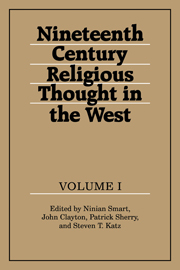9 - LUDWIG FEUERBACH AND KARL MARX
Published online by Cambridge University Press: 05 August 2016
Summary
Most discussions of the relationship between Karl Marx (1818–83) Ludwig Feuerbach (1804–72) focus on the brief period between 1841 and 1844 when the young Marx was profoundly influenced by Feuerbach's criticism of Hegel, his theory of religion as the projection of human attributes, and his new humanism. Because Marx was ultimately to emerge as the more influential thinker of the two – although at the time it was Feuerbach who was famous and Marx almost unknown – such discussions tend to interpret Feuerbach as a minor, transitional figure in the larger movement of intellectual history from Hegel to Marx. They concentrate, therefore, on Feuerbach's writings around 1841 and ignore the subsequent development of his ideas, especially those concerning religion. From the standpoint of religious thought, however, this interpretation underestimates the significance of Feuerbach's life-long attempt to develop what Paul Ricoeur has called a ‘hermeneutics of suspicion’, that is, a systematic interpretation of religion based on atheistic principles.
If the conventional interpretation of Feuerbach and Marx tends to be unfair to Feuerbach, a discussion of the two figures that focuses primarily on their criticisms of religion will seem unjust to Marx. Not only did he not write a great deal about religion as such but he believed that any attempt to develop an abstract theory of religion was itself a serious error. Religion, he argued, is not an autonomous sphere of human behavior and belief but reflects a more fundamental social alienation; hence, the only way to deal with it is by means of a critical theory of society as a whole.
- Type
- Chapter
- Information
- Nineteenth-Century Religious Thought in the West , pp. 291 - 328Publisher: Cambridge University PressPrint publication year: 1985
- 1
- Cited by

